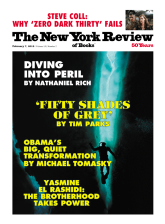In response to:
How He Got It Right from the January 10, 2013 issue
To the Editors:
I was flattered and pleased to see a review of my book, The Physics of Wall Street, in The New York Review [January 10]. However, Andrew Hacker’s characterization of the views in the book strike me as wide of the mark. If I may, I would like to offer a few clarifications.
Hacker says my “one big idea” is that “insights that are commonplace in physics…are useful in studying virtually anything.” But the abbreviated quotation obscures the point I am trying to make in this passage. What I say is that “if physicists have been successful at improving our understanding of finance, it is because they have approached problems in a novel way, using methodological insights that are commonplace in physics (and engineering) and which are useful in studying virtually anything.” The “methodological” is important here, because the principal argument of the book is that financial models are best understood in the context of a particular methodology. That methodology involves using simplifying assumptions to make an otherwise impossible problem tractable, and then studying how those assumptions should be expected to fail and what will go wrong when they do. The thesis of the book is that one can use models effectively to inform decision-making—but only by understanding that models have, at best, limited domains of approximate application. It is this recognition of the limitations of model building that I would have “pervade the entire financial industry,” as Hacker puts it.
In this vein, I do not believe that “markets…are subject to physical laws,” as Hacker says I do. Indeed, the methodology I describe has nothing to do with uncovering underlying market laws—and I explicitly argue against thinking of models in this way. As I explain in the book, “We should never mistake a good model for the ‘truth’ about financial markets.” Instead, modelers are “trying to find some equations that give…the right answer some of the time, and to understand when they can be relied on.” These equations can provide useful and subtle insights into markets and for this reason they can inform decision-making. But as I write in the book, one should not make the mistake of believing that “financial modelers are somehow marching along the path of scientific progress, inexorably approaching some ‘final theory’ of finance.”
James Owen Weatherall
Assistant Professor of Logic and Philosophy of Science
University of California, Irvine
Irvine, California
Andrew Hacker replies:
The chief concern in my review was not whether Professor Weatherall’s methodologies will yield a “final theory” of finance, since that isn’t going to happen. Rather, it was how elegant equations have fostered financial nostrums, from which we are still reeling. Given the exuberant tone of his book, the caveats in his letter amount to sidebars. And while his bibliography lists Jeremy Bernstein, Emanuel Derman, Roger Lowenstein, and Scott Patterson, he omits their accounts of the damage wrought by the models he champions.




